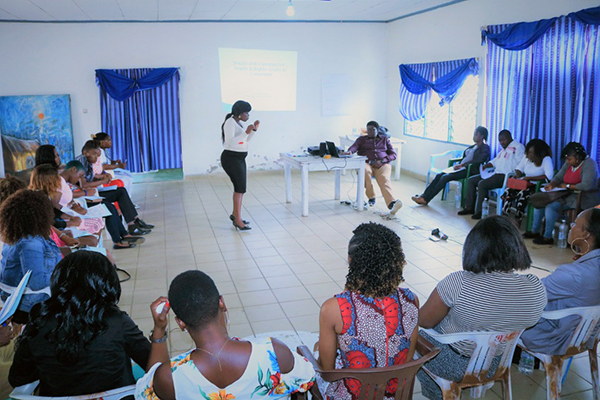 Civil society activists, the United Nations, and development organizations, who understood and saw the need for countries to commit in the achievement of universal health coverage (UHC), have engaged in longstanding advocacy for UHC. On September 23, 2019, during the United Nations General Assembly (UNGA), country governments unanimously adopted the Political Declaration for Universal Health Coverage. The hope is that, following UNGA, country governments will introduce or accelerate the process of introducing UHC schemes in their country. Since every state is called upon to decide on what will work best in their country based on country realities, the process of ensuring that populations have access to health care wherever and whenever needed is now in the court of each country’s government.
Civil society activists, the United Nations, and development organizations, who understood and saw the need for countries to commit in the achievement of universal health coverage (UHC), have engaged in longstanding advocacy for UHC. On September 23, 2019, during the United Nations General Assembly (UNGA), country governments unanimously adopted the Political Declaration for Universal Health Coverage. The hope is that, following UNGA, country governments will introduce or accelerate the process of introducing UHC schemes in their country. Since every state is called upon to decide on what will work best in their country based on country realities, the process of ensuring that populations have access to health care wherever and whenever needed is now in the court of each country’s government.
It is now time to “walk the talk” and for governments to do the work post-UNGA. Civil society advocates, private sector, technical and financial partners, and other stakeholders ought to put hands on deck and support governments in the achievement of UHC. Below are three action points for civil society organizations (CSOs) at the country level to support UHC processes:
- Build UHC national platforms: Working together has consistently proven to be better than acting in silos. Forming national platforms where the voices of CSO representatives can be amplified, gives room for a broader representation during UHC policy development. A national platform will also provide the opportunity for improved communication and best practice sharing between country platforms around UHC and on systems of holding country governments to account. Ashman et al. (2005) stated that networks provide opportunities to coordinate several organizations’ activities to achieve a common policy goal, strengthen legitimacy to hold governments accountable for policies, give protection to organizations and individuals who might otherwise face retribution for speaking out. The benefits of CSO collaboration for the implementation of UHC at the country level is critical for the achievement of Health for All by 2030.
- Mobilize and Sensitize Communities on UHC: The very presence of CSOs within communities gives room for grassroots mobilization and sensitization on UHC. This is very important, especially in countries with dominant informal sector workers where UHC schemes might rely on voluntary or mandatory pre-payments or tax schemes from the informal sector to raise the extra revenue needed for the UHC scheme. Without proper community mobilization from civil society, mobilizing funding from informal sector workers will prove impossible as these individuals might likely evade taxes. Additionally, countries with weak tax institutions may be unable to asses and tax their income. There is thus a need for communities to understand the concept of social solidarity and CSOs are better placed to communicate this message. Community mobilization for UHC is vital to empower communities to hold their government accountable for what they signed up for and the quality of services delivered to them.
- Build a case for Primary Health Care and Support Government in Strengthening PHC: Primary Health Care (PHC) was, for many years, considered as care for the poor as opposed to ‘first point of care’ in a health system. In most country health systems, PHC structures were poorly equipped and understaffed to serve the rural and poor communities (Walraven, 2019). It is thus essential for CSOs to build on country experiences like that of the United Kingdom to influence the restructuring of PHC systems to meet the needs of all equitably. The current state is far from ideal: PHC in many countries is underfunded, unequipped, understaffed and poorly structured. The Universal Health Coverage Global Monitoring Report states that a 1% increase in country GDPs on PHC is required to accelerate coverage and expand services worldwide. Investing resources and funding on health without prioritizing PHC will be ineffective. CSOs should support governments to identify and put in place the right tools for the right job.
Building a healthier world requires everyone to get involved and move together. For countries to succeed in achieving Health For All, civil society needs to be highly engaged in ‘walking the talk’ at country level.

